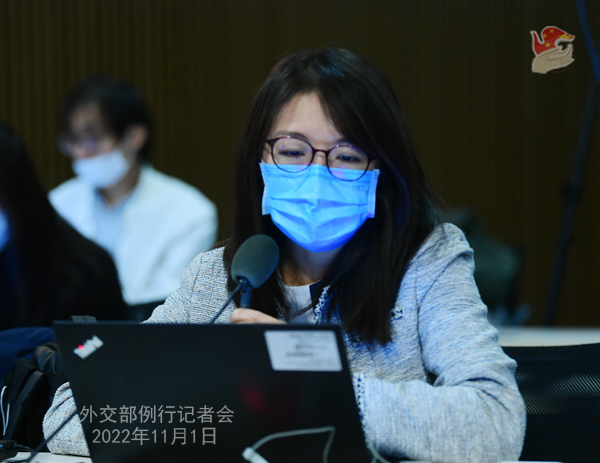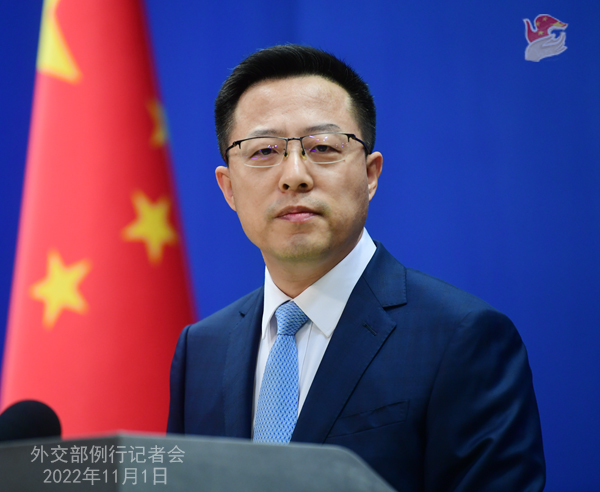
CCTV: On October 31 local time, more than 60 countries at the Third Committee of the 77th session of the United Nations General Assembly in a joint statement expressed support for China’s position on issues related to Xinjiang, Hong Kong and Tibet and opposition to interference in China’s internal affairs under the pretext of human rights. Do you have any comment on this?
Zhao Lijian: On October 31 local time, at the Third Committee of the 77th session of the United Nations General Assembly, Cuba delivered a joint statement on behalf of 66 countries. They pointed out that issues related to Xinjiang, Hong Kong and Tibet are China’s internal affairs. They spoke against the politicization of human rights issues, the application of double standards and interference in China’s internal affairs in the name of human rights. The joint statement calls on all parties to abide by the purposes and principles of the UN Charter, respect the right of people of each state to choose independently the path for development in accordance with their national conditions. It also stressed that the international community should strengthen solidarity and coordination and promote and protect human rights. Another 30-plus countries voiced their support for China via separate statements or joint letters. Once again, nearly 100 countries spoke up for justice and voiced support and understanding for China’s justified position at the UN, as had happened during the the 51st session of the Human Rights Council. People know what the truth and facts are. The community of nations, especially the developing countries, are against the politicization of human rights issues. The attempt of few Western countries to use issues like Xinjiang to smear, suppress and contain China will not succeed.
The Third Committee is a platform for dialogue and cooperation, not a wrestling ground for division and confrontation. The world has long been clear-eyed about and tired of the farcical shows of few Western countries’ politicization of human rights and double standards. We urge these countries to stop their condescending lectures and stop using human rights as a pretext for political manipulation, slander and rumor-mongering, and containment and suppression. What they need to do is deeply reflect on their own human rights woes, learn their lesson from the human rights disasters they have brought onto other countries and return to the right track of cooperation and dialogue.
The Paper: China announced that German Chancellor Olaf Scholz will visit China. What are China’s expectations for that?
Zhao Lijian: At the invitation of Premier of the State Council Li Keqiang, Chancellor Olaf Scholz of the Federal Republic of Germany will pay an official visit to China on November 4.
This year marks the 50th anniversary of the establishment of diplomatic ties between China and Germany. The two countries are comprehensive strategic partners. This will be the first visit to China by a European leader since the start of COVID-19, and the first China visit by Chancellor Scholz since he took office. Leaders of the two countries will have an in-depth exchange of views on China-Germany relations, China-Europe relations, and global dynamics and governance, further consolidate political mutual trust, and deepen China-Germany cooperation. This meets the interest of both sides. We believe this visit will inject new impetus into deepening China-Germany comprehensive strategic partnership in a new era, and contribute to world peace, stability and growth.
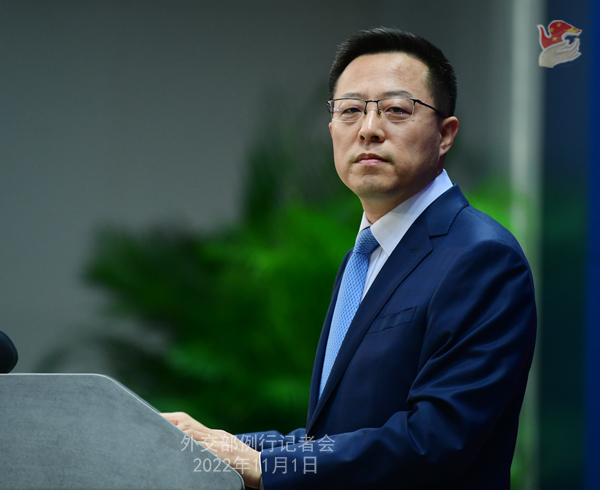
CCTV: According to statistics released by the National Bureau of Statistics yesterday, China’s innovation index reached 264.6 in 2021, up by 8% over the previous year. By field, the innovation environment index, innovation input index, innovation output index and innovation effectiveness index all registered an increase compared to the previous year. Do you have any comment?
Zhao Lijian: I saw this group of statistics. I also read the official announcement of the National Bureau of Statistics which noted China’s accelerated advancement of innovation in 2021 and the improved environment, steady rise in input and fast-growing output of innovation as well as the positive effect this has generated, which provided key underpinning for China’s high-quality development.
Over the past ten years, we have accelerated efforts to build our self-reliance and strength in science and technology, with nationwide R&D spending rising from 1 trillion yuan to 2.8 trillion yuan, the second highest in the world. Our country is now home to the largest cohort of R&D personnel in the world. We have grown stronger in basic research and original innovation, made breakthroughs in some core technologies in key fields, and boosted emerging strategic industries. China has joined the ranks of the world’s innovators. According to the World Intellectual Property Organization (WIPO)’s Global Innovation Index 2022, China moved up from the 34th in 2012 to the 11th in 2022. This is an important recognition of China’s achievement in sci-tech innovation. WIPO Director General said that China nurtures its innovation ecosystem in a holistic, comprehensive manner, which is integral to China’s success.
China’s growing scientific and technological capabilities are a driving force for global sci-tech advancement. We have always cooperated with other countries on sci-tech innovation to share the dividends of development, and we are explicitly against sci-tech hegemonism, decoupling and breakage of industrial and supply chains. So far, China has established sci-tech cooperation with over 160 countries and regions and signed more than 110 inter-governmental sci-tech cooperation agreements. Chinese innovation such as high-speed railway, Juncao and COVID-19 vaccines are shared with people across the world and have become the most shining name brands for China. China will continue to follow the innovation-driven development strategy and be even more open as we step up sci-tech innovation cooperation with the rest of the world.
AFP: Regarding the debate at the UN, some countries signed a joint statement to condemn the Chinese government’s human rights abuses in Xinjiang. Do you have any response to their statement specifically? Will China follow any recommendations of the assessment by the Office of the High Commissioner for Human Rights?
Zhao Lijian: I just made China’s position amply clear. We have also stated our position on the assessment you mentioned quite a few times. This so-called assessment is not authorized by the Human Rights Council, nor is it agreed to by the Chinese government and is thus illegal, null and void. It is a patchwork of disinformation that serves as a political tool for the US and some Western forces to strategically use Xinjiang to contain China. It also violates the principles of universality, objectivity, non-selectivity and non-politicization. Of all people, the people in Xinjiang, whatever their ethnic backgrounds, are in the best position to tell the world what the human rights conditions are like in Xinjiang. The US and some Western countries’ attempt to use Xinjiang to contain China will not have people’s support and will only fail.
Beijing Youth Daily: The Mengtian space lab module, the third major component of China’s Tiangong space station, was successfully launched, and conducted a rendezvous and docking with the two-module combination of Tiangong. What is China’s comment?
Zhao Lijian: Warm congratulations on the successful launch of the Mengtian space lab module. This is not only a milestone in China’s manned space program, but also another important contribution China has made to the international aerospace undertaking. The report to the 20th CPC National Congress set the goal of boosting China’s strength in aerospace. We will continue to work hard for the peaceful exploration and use of outer space, and use space activities for the benefit of the economic and social development of countries in the world.
China always relies on its own capabilities in its manned space program, and at the same time actively engages the world. We have signed cooperation agreements with numerous aerospace institutions and organizations and carried out cooperation programs in various forms. China’s Space Station is the first of its kind to be open to all UN member states. So far a number of science experiment projects from 17 countries including Switzerland, Poland, Germany and Italy have been included in the selected projects of China’s space station. Let us hope that greater success is still to come for China’s manned space program and that China’s space station will soon become a “home in space” for all.
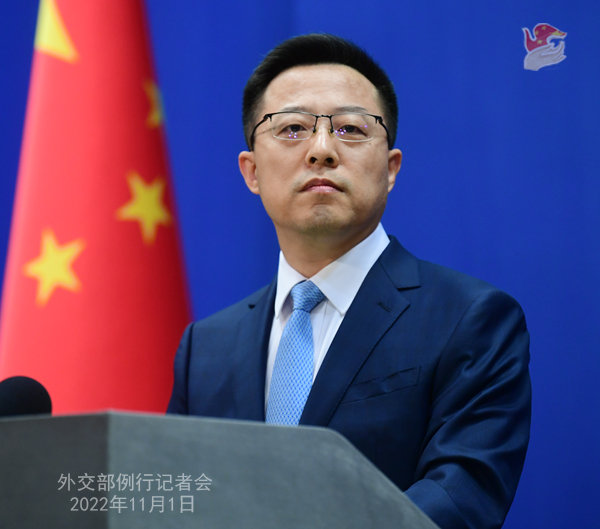
Phoenix TV: We noted that the US Department of Defense released the 2022 National Defense Strategy, in which China was believed “to present the most consequential and systemic challenge” to US national security. It wrote, “The PRC seeks to undermine US alliances and security partnerships in the Indo-Pacific region, and leverage its growing capabilities, including its economic influence and the People’s Liberation Army’s growing strength and military footprint, to coerce its neighbors and threaten their interests”. What is China’s comment?
Zhao Lijian: We have noted the National Defense Strategy (NDS) released by the US government. Just like the latest National Security Strategy released by the White House, the 2022 NDS plays up major-country competition and deliberately misrepresents China’s foreign and defense policies. It is driven ostensibly by a Cold War zero-sum mentality and the logic of domination and hegemonism and says everything about the ill intention of the US to contain and suppress China under various false pretexts.
The world is undergoing changes of a magnitude unseen in a century. The historical trends of peace, development, cooperation, and mutual benefit are unstoppable. And yet, the hegemonic, high-handed, and bullying acts of using strength to intimidate the weak, taking from others by force and subterfuge, and playing zero-sum games are exerting grave harm. China has always been committed to its foreign policy goals of upholding world peace and promoting common development, and it is dedicated to promoting a human community with a shared future. China pursues a defensive national defense policy, and its development strengthens the world’s forces for peace. No matter what stage of development we reach, we will never seek hegemony or engage in expansionism. China has always been a force for world peace, a contributor to global development, a defender of the international order, a provider of public goods and part of the mediation efforts on hotspot issues. At the same time, we firmly oppose all forms of hegemonism and power politics including attempts to blackmail, contain, blockade, and exert maximum pressure. We oppose the Cold War mentality and double standards. We will resolutely defend our national sovereignty, security and development interests.
We urge the US to follow the trend of peace and development, abandon the Cold War zero-sum mentality, stop viewing today’s world and China-US relations from a confrontational perspective, and stop distorting China’s strategic intentions. The US needs to follow through on President Biden’s “five-noes” commitment, and work with China to bring China-US relations back onto the track of sound and steady development. This is the right choice that is good for China, good for the US and good for the world at large.
Reuters: Does China support Ukraine carrying out grain exports, much of which is essential for developing countries’ food stocks?
Zhao Lijian: China’s position on the Ukraine crisis is consistent and clear. Under the current circumstances, all parties concerned need to stay calm and exercise restraint, prevent further escalation and jointly work for deescalation. On the food issue you mentioned, China has put forward an initiative on international food security cooperation. We are willing to step up communication and cooperation with all parties in this regard to build more international consensus and help ensure global food security.
China News Service: As we have learned, a symposium to commemorate Rewi Alley’s spirit and celebrate the 50th anniversary of diplomatic relations between China and New Zealand was successfully held recently in New Zealand, which received wide attention from all walks of life in China and New Zealand, and triggered a growing interest in Rewi Alley and China-New Zealand friendship. Can you share more with us about the event? How do you view the development of China-New Zealand relations?
Zhao Lijian: Rewi Alley, a symbol of China-New Zealand friendship, was an old friend of the Chinese people. He lived and worked in China for 60 years, and made important contribution to China’s revolution, nation-building and development and to nurturing China-New Zealand friendship. Several days ago, a symposium to commemorate Rewi Alley’s spirit and celebrate the 50th anniversary of diplomatic relations between China and New Zealand was held in his home city Christchurch. Representatives of the governments of China and New Zealand, his relatives and people from all walks of life in New Zealand participated in the event. They shared the commitment to carry on Rewi Alley’s spirit, carry forward the tradition of seeking common ground while reserving differences and pursuing mutual benefits, and strengthen the friendship between China and New Zealand.
China and New Zealand are each other’s important cooperation partners. For 50 years since the establishment of diplomatic ties, bilateral relations have made significant progress and bilateral cooperation has created many “firsts”. The two countries have set a successful example of how countries with different social systems, histories and cultures and at different development stages can work together for mutual benefit. China is ready to work with New Zealand to take the 50th anniversary of diplomatic ties as an opportunity to boost mutual trust, expand mutually beneficial cooperation, advance cultural exchanges, and keep strengthening the China-New Zealand comprehensive strategic partnership on a sound and steady course.
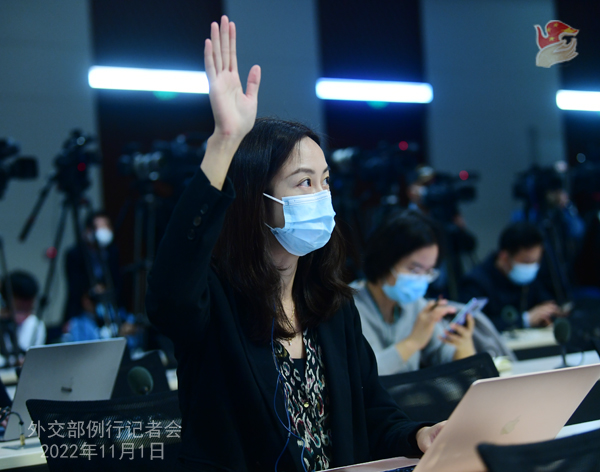
AFP: Pakistan’s Prime Minister will soon visit China. What expectations does China have for that? Will new cooperation agreements be signed?
Zhao Lijian: Yesterday, I shared with you China’s principled position on Prime Minister Shehbaz Sharif’s visit to China. We warmly welcome him to China. During the visit, the two sides will definitely sign a series of outcome documents. As for the specific agenda of the visit, we will release more details as soon as we have them. Please check back for updates.
Bloomberg: Australia’s resources minister said that while Western countries are unlikely to end their reliance on China for critical minerals including rare earth anytime soon, Australia and the US will still work together to boost investment in these minerals in an attempt to offer alternatives. Does the foreign ministry have any comment?
Zhao Lijian: We noted the remarks from the Australian side. We believe that countries with critical mineral resources need to play a positive role in keeping relevant industrial and supply chains safe, secure and stable. Countries need to jointly step up to their due responsibilities in the global supply of relevant minerals, and ensure the normal functioning of relevant trade and economic cooperation. Meanwhile, no one should use economy as a political tool or weapon, destabilize the global industrial and supply chains or punch the existing world economic system. China will remain an integral part of the international industrial division of labor and cooperation and strive to keep the world economy and international trade stable and diversified.
Reuters: Over the last day or so, cities across Ukraine have suffered missile attacks coming from Russia. This follows weeks of similar attacks. Russian President Vladimir Putin has said that this is in response to drone attacks on a Russian fleet. I know you just said that China hopes that the situation deescalates, but China has said many times that China understands the legitimate security concerns of Russia. Does China feel that firing missiles at civilian buildings and infrastructure across Ukraine constitutes safeguarding the legitimate security interests of Russia?
Zhao Lijian: I have just made clear China’s position on the Ukraine crisis. Under the current circumstances, all parties need to stay calm and exercise restraint, encourage and support all diplomatic efforts conducive to peacefully resolving the Ukraine crisis and jointly work toward deescalation.
